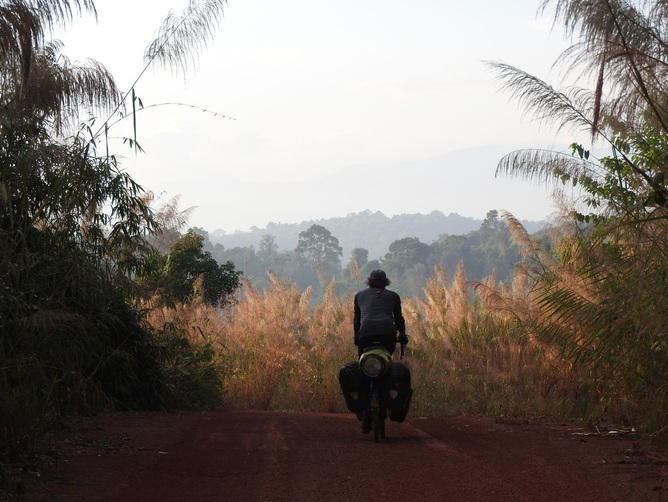
On the first day of 2016, we left the beach bum's paradise of Koh Ta Kiev and cycled from Otres Beach to Sihanoukville. Failing to find anything charming about the place on first impression, we opted for a quick lunch and grocery shop, before continuing on. In an effort to stay off of the main roads, Matt plotted out one of his famous short cuts that turn out to be long cuts. The road turned to dirt and passed by farmland and the occasional homestead. It wasn't long before it narrowed to a sandy track crowded with dry grasses taller than us. We felt like we were riding though the savannah of Africa minus any exciting megafauna. We wouldn't have minded pushing our overloaded bikes through sand pits, or unloading and hauling our them across deep canyons of erosion, if it were not for the knowledge that a perfectly rideable road paralleled this one just a few kilometers away. It's a lot easier to be enthusiastic about such challenges when you know there are not more logical options to get to where you want to go.
With our slow progress along the African detour, we didn't make it to Chi Phat that day, but instead overnighted in an interesting riverside town at a humble guesthouse run by a really friendly family. They were genuinely excited to have us stay there. The next day we made it up the dirt road to Chi Phat faster than we anticipated. The final step in reaching the rural village was a pedestrian and bike ferry across a mellow stretch of river, the ferry being nothing more than a floating wooden platform with a motor attached. While Chi Phat may be out of the way, it's not exactly off the beaten path of tourism, but in a good way. It is widely regarded as the most successful example of Cambodia's Community-Based Ecotourism initiative. Our first stop was the official visitor center where we arranged a homestay that was really just a small guesthouse with a Khmer customer base. Nonetheless, the owner was lovely and she had her son guide us to a great swimming hole along the river after we briefly settled in.
We spent the next couple of days hanging around the village and doing some work on the computer at the visitor center, including applications for a sea kayaking instructor position in Malaysia (which obviously we didn't get). By then, we had decided which of the many tempting options of eco-adventures we wanted to do for a surprisingly affordable price. While we normally don't do tours and prefer to explore on our own, we wanted to support the basis of the eco-tourism program that gives locals an alternative livelihood to the previously rampant illegal poaching and tree harvesting in the area. Some people claim that 95% of the community now abstains from these destructive practices because they have seen the benefits of eco-tourism. While it seems most tourists opt for multi-day guided treks in the surrounding foothills of the Cardamom Mountains, we signed up for a mountain bike day trip. Apparently we don't spend enough time riding bikes already.
After a bit of disorganization when we showed up early the next morning--it wouldn't be Cambodia otherwise--we tested the mountain bikes and determined they were functional...enough. After pushing our bikes through a shallow spot in the river, we rode some fun single track through meadows and forest to an archeological site. We hiked up to the base of some cliffs and then climbed some makeshift ladders to peer at a row of ancient burial jars tucked away on a protected ledge. They are believed to be around 500 years old and possibly from a culture that was at odds with the Angkorian empire and retreated into the Cardamom Mountains to avoid persecution.
Next, our guide led us to a beautiful arc of waterfalls dropping in to a wide pool. Swimming behind the falls was the perfect way to cool down in the midday heat. The last stop was a bat cave devoid of roosting bats. While our guide didn't speak much English, he indicated that the bats were out flying around and would come back at night. I pondered the biological possibilities of diurnal bats until we returned to the visitor center. There we learned that the bats do not frequent that cave during the dry season and our guide should have taken us somewhere else. Having seen a few caves with bats before, we weren't heartbroken over the oversight and thought it was a worthwhile day overall.
We rolled with the hills until we reached the city of Koh Kong along the border of Thailand. It was strange to think that we had been just on the other side of that border one year ago, but decided not to continue in to Cambodia. Now here we were. We had come so far only to end up so close to where we had been. Perhaps even more ironic was settling in to Koh Kong for a few days of planning a return to Thailand in a month or so, this time meeting up with Matt’s parents in Bangkok and together hitting spots around the country that we missed before.
The first day had both perfectly paved roads (the ones that led to a massive dam) and rough dirt tracks (the ones that did not lead to a dam). After a particularly rough incline on loose gravel where my bike slipped out from underneath me a couple of times, we called it a day at the top of the hill. We made camp underneath a tremendous power line tower, the counterpart to all of the hydro-development in the theoretically protected mountains. While we ultimately enjoyed camping in the peace and quiet...er...peace and buzzing of electricity overhead, we were first swarmed by bees, then the mosquitos came out in force while cooking and eating a pasta dinner. We retreated in to our tent as quickly as possible, despite not successfully airing out its putrid stench from not one, but two, unpleasant discoveries. When Matt set up the tent, first he found a rotting gooey dead scorpion in it, followed by a little desiccated gecko. Apparently we had carried them with us from the beach on Koh Ta Kiev. Poor guys, but man did those little things stink! Oh, and both of our air mattresses had developed valve leaks and deflated within minutes. Ah, the joys of camping!
The next day was a long one for only covering 37 miles. Steep hills made slow going on the up and down, and we made lots of breaks for photos, snacks, and filtering water whenever we found a source. One time we opted for a clear, flowing drainage ditch on the side of the traffic-free road only to observe a dude on his motorbike pull over to pee into it a few minutes after we finished purifying our supply. I suppose it was good timing, but who's to say there wasn't a different dude peeing into the ditch a few minutes before we arrived?
Approaching the village of Osam in the dusk, we descended out of the forest and were completely distracted by the burnt skeletons of old growth trees towering above young banana plantations. New settlements lined the road. It appeared that the forest had been recently cleared to make way for agriculture, as frequently happens even in (theoretically) protected areas, but we could not fathom intentionally burning those massive trees. It was rural sprawl in the virgin land of opportunity, at the expense of the Cardamom's off-the-charts biodiversity. But what alternatives do poor Cambodians saddled with an ineffective and corrupt government realistically have? The motivation to stake your small claim only increases in the face of wholesale "leases" of national parks to resort developers and resource extraction corporations.
We reached Osam well after dark and locals kindly pointed us in the direction of a surprisingly nice guesthouse. We both loved and hated that it was filled to the brim with gorgeous furniture and intricate decorative wall carvings made of solid blocks of hardwood. In keeping with the evening's theme, a woodcarver based in Siem Reap struck up conversation with us in labored English during dinner in a restaurant where the regular patrons watched us curiously but would not make eye contact with us. We gathered that he was on a business trip to buy wood from the settlers of this fragmenting forest.
Our spirits soared when we rode by an eco-tourism information center and guesthouse on our way out of town the next morning. After parking our bikes, we were offered a plate of delicious papaya and drinking water free of charge, but the shy and smiling staff did not speak English. We saw fliers posted about a tour to observe the endangered Siamese Crocodile and wondered if it would be worth trying to arrange something anyway. Luckily, a research biologist who was staying there returned from the field and explained that the English-speaking guide-owner was away in Koh Kong. Too bad. We pedaled on, taking a short cut on a platform bike ferry like the one in Chi Phat, this time captained by an 8-year-old.
We stopped for a snack in a shady spot on the side of the road. Shortly thereafter, a policeman on a motorbike slowed at the sight of us and cut his engine. He dismounted. "Oh boy. Here we go," we thought. He didn't say anything. He walked to the other side of the road, turned his back, and took a piss. Once finished with his highest priority, he gave us a big grin and sat down cross-legged on the ground with us, his firearm dangling off the handlebars of his motorbike. He didn't seem to speak or understand a world of English and our Khmer was still sadly limited to a few basic phrases, but we all pretended to have a coherent conversation through hand gestures. When that lapsed, he offered us a cigarette. Once a motorbike entourage of other police passed by, he abruptly got up and zoomed off. We made another mental tick mark in the category of "Things that Would Never Happen in The States".
Next, a group of outgoing dirt bikers cut their engines to inform us that another bicycle traveler was close behind us. They relayed that he was traveling light, didn't want to spend the money to stay in a guesthouse, and looked like he could use a few more calories in his digestive system on a daily basis. So it was not much of shock when a couple of miles down the road, as we caught our breath at the top of a rise, he closed the gap. "Hello, Sven! Your reputation proceeds you." We had the usual get-to-know-you exchange of bicycle travelers, then he informed us that he would ride with us “because he was tired of riding alone,” even though he could obviously go much faster.
We were just a couple miles shy of reaching the next town when we were caught out in a downpour, the only one we had cycled in since somewhere in the middle of Vietnam. When it did not let up after arriving to a small town, even Sven decided to splurge on a $5 room. While Sven was speedy in the bike seat, we found out that we were all compatibly slow with getting going in the mornings. That is about where our similarities ended. He had been on the road more or less continually for eight years, with a little time spent in his homeland of Germany. The point of each day was not photos, or even to say hello to the people he passed by, but simply to move further along his intended route. He had stories and he was eager to share them. Perhaps a little too eager at first. Our day was a barrage of, “One time, when I was in _______ …” and the blank could be filled with any ridiculous country you can imagine. This included Pakistan, where he was escorted by military babysitters who determined exactly when, where, and how he ate and slept.
By the end of the day, our route through the Cardamoms had flattened out as we crossed valleys of meadows and farmland. While this provided views of the surrounding mountains, progress was still a bit slow on the rutted dirt road. In the early evening, we pulled over to chat with a young German couple on motorbikes. In an exciting coincidence, Sven quickly discovered that they were all from the same small town, though they did not know anyone in common. We invited Arne and Claudia to camp with us, but without a tent and gear, they were determined to push on to the next major city of Battambang. The three of us set up camp on an abandoned side road and enjoyed our last night of our Cardamom crossing.
The next morning would be a straight flat shot on a dusty road and a busy highway in to Battambang, but not before dealing with a few surprises. We woke up to find an ant invasion of our everything--panniers, shoes, food, under the tent, and crawling all over our bikes—nothing was spared. They had even chewed small holes in Matt’s sweat-encrusted cycling shirt. While dealing with dispersing them, Matt’s back suddenly tightened and hurt him for the rest of the day. Before leaving camp, he noticed a tear in the sidewall of his tire, but I encouraged him to ride on it and see if it would hold until Battambang. It didn’t. So that foldable yet hefty spare tire we had been carrying for a year and a half actually came in handy for a roadside repair in the blazing sun.
While our final day was not the most inspiring, we didn’t regret taking on the challenge of this route in the least. As the natural resources of the Cardamom Mountains are increasingly targeted by both large and small-scale exploiters, change is evident at every turn in the road. As is the case around the globe, the improved and expanded road network we were relying upon for our experience is also a culprit in the accelerated pace of change. But there is still plenty left to conserve. There is undeniably great eco-tourism potential, so the question remains: what would it take for this area to become the next Chi Phat?

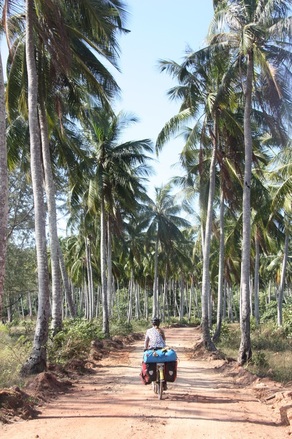
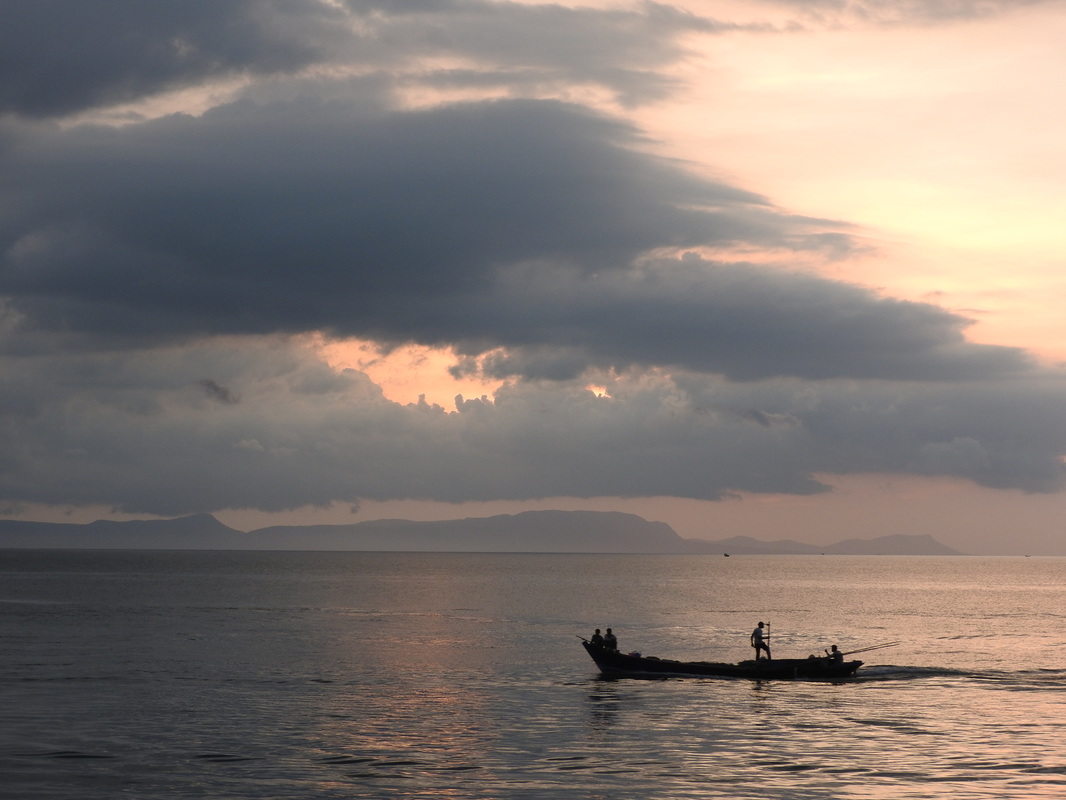
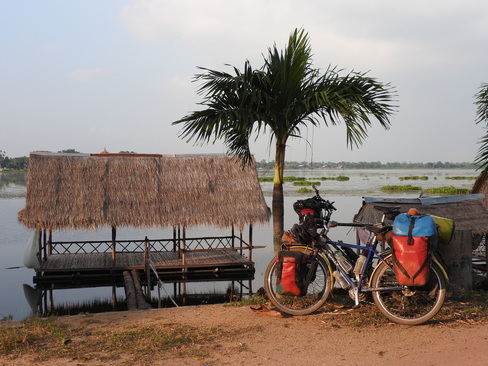
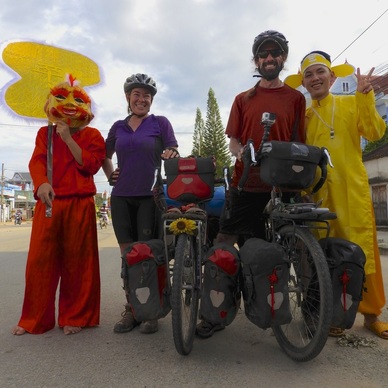
 RSS Feed
RSS Feed
